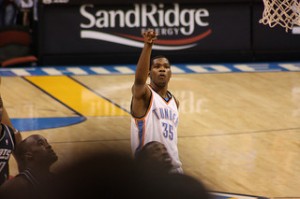Kevin Durant Impersonates Russell Westbrook for Sprint
If you have been watching the NBA recently – and with the playoffs going on, you should be – you may have seen the following ad for Sprint:
Often people don’t pay attention to what people say in ads. But this one – starring Kevin Durant of the Oklahoma City Thunder – has a very interesting opening line: “Man I was double-teamed. With no one to pass it to, so I pulled up and hit the shot for the win…”
Let’s think about this for the moment. Durant says he has two defenders on him (i.e. he is double-teamed). That means – if the other team is playing the standard five players, there are three more defenders on the court. And if Durant has four teammates on the court (and that would be standard), there must be someone open. But Durant says that there is no one to pass it to.
Hmmmm….
If you watch closely, Durant isn’t really double-teamed. But the words still seem quite revealing of something we noted in Stumbling On Wins (and The Wages of Wins
, and in academic articles, and… okay, I said this a few times before). NBA players are primarily paid to score. So although Durant had to have someone open, he really doesn’t have much incentive to find that player. Players get paid more when they take the shot. Having their teammate take a shot – even if it is an open shot – may help the team win the game, but it doesn’t always help an individual player get paid.
Now in Durant’s case, it is often true that he is one of the best options on the Thunder (although probably not if he was really double-teamed). And Durant is actually above average – for a small forward – with respect to assists (so he does pass the ball).
There is another Thunder player, though, who Durant appears to be impersonating.
During the regular season, Russell Westbrook finished 5th in the NBA in points scored per game (Durant finished first). Although this scoring mark might seem impressive, when one delves a bit deeper we see that of the six players to log 1,000 minutes for the Thunder this year, Westbrook was 6th in effective field goal percentage (field goal percentage from the field that adjusts for the impact of three-point shooting). And he was only 5th in true shooting percentage (this percentage adjusts from both three-point and free throw shooting). Furthermore, relative to an average point guard, Westbrook was… well, about average with respect to shooting efficiency (he was also below average – for a point guard – with respect to assists).
In contrast, Durant – relative to an average small forward – was well above average with respect to shooting efficiency. And James Harden — relative to an average shooting guard – was just amazing. Whereas the average two-guard has an effective field goal percentage of 48.2%, Harden posted a mark of 58.2% (or 10 points higher). Per game, though, Westbrook took nine more shots from the field than Harden.
Now who would make such a decision? Who would think it is a good idea to have Westbrook – with an effective field goal percentage of 48.1% — take nine more shots per game than Harden? Well, Westbrook is the Thunder’s point guard. So many possessions begin with Westbrook having the ball. And just like the Sprint commercial, often Westbrook – given the incentives he faces — probably can’t see anyone who is open. So therefore, he simply has to take the shot. The means that Westbrook scores more points than Harden. And it also means that Westbrook makes more money than Harden.
In fact, Westbrook signed a contract extension in January that reportedly will pay him the maximum salary allowed by the NBA’s Collective Bargaining Agreement. One suspects that if Westbrook didn’t score so much – and he wouldn’t if he passed more to players like Harden – the Thunder would be even more impressive on the floor. But Westbrook’s contract would be less impressive. And so, it pays to believe in the NBA that “no one is open”. Even if the mathematics of the game tell us that this probably isn’t true.


Comments